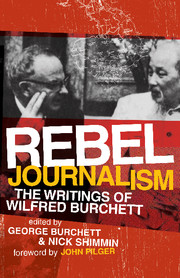Book contents
- Frontmatter
- Contents
- List of Photographs
- Acknowledgements
- Foreword by John Pilger
- Foreword by Gavan McCormack
- Introduction
- 1 The Atomic Plague [1945]
- 2 With Mick Griffith to the Plaine des Lacs [1941]
- 3 Who is Wingate Anyway? [1944]
- 4 The Trial of Cardinal Mindszenty [1951]
- 5 Liberty in Eastern Europe [1951]
- 6 The Microbe War [1953]
- 7 Koje Unscreened [1953]
- 8 The Ball-Point Pen Murders [1954]
- 9 South of the 17th Parallel [1955]
- 10 Front-Line Village [1959]
- 11 Welcome Home [1961]
- 12 Gagarin: The First Interview with Western Journalists [1961]
- 13 Virgin Lands [1962]
- 14 Lilac and Outer Space [1962]
- 15 War Against Trees [1963]
- 16 The Tragedy of South Vietnam's Ethnic Minorities [1964]
- 17 Interview with General Vo Nguyen Giap (April 13, 1964)
- 18 A Fortified Hamlet [1965]
- 19 Patriots & Mercenaries [1965]
- 20 At Ground Level [1966]
- 21 A Spurned Olive Branch [1967/1977]
- 22 Personal Leader [1968]
- 23 The Tet of Peace [1973/1977]
- 24 ‘Something from Nothing’ Township [1976]
- 25 Evaluating the Past [1976]
- 26 Mercenaries: British Export Model [1977]
- 27 The Geneva Conference [1978]
- 28 How to be a Good Khmer Rouge [1981]
- 29 China Prepares to Attack Vietnam [1981]
- 30 Afterword [1983]
- Notes
- Bibliography
- Index
15 - War Against Trees [1963]
Published online by Cambridge University Press: 22 September 2009
- Frontmatter
- Contents
- List of Photographs
- Acknowledgements
- Foreword by John Pilger
- Foreword by Gavan McCormack
- Introduction
- 1 The Atomic Plague [1945]
- 2 With Mick Griffith to the Plaine des Lacs [1941]
- 3 Who is Wingate Anyway? [1944]
- 4 The Trial of Cardinal Mindszenty [1951]
- 5 Liberty in Eastern Europe [1951]
- 6 The Microbe War [1953]
- 7 Koje Unscreened [1953]
- 8 The Ball-Point Pen Murders [1954]
- 9 South of the 17th Parallel [1955]
- 10 Front-Line Village [1959]
- 11 Welcome Home [1961]
- 12 Gagarin: The First Interview with Western Journalists [1961]
- 13 Virgin Lands [1962]
- 14 Lilac and Outer Space [1962]
- 15 War Against Trees [1963]
- 16 The Tragedy of South Vietnam's Ethnic Minorities [1964]
- 17 Interview with General Vo Nguyen Giap (April 13, 1964)
- 18 A Fortified Hamlet [1965]
- 19 Patriots & Mercenaries [1965]
- 20 At Ground Level [1966]
- 21 A Spurned Olive Branch [1967/1977]
- 22 Personal Leader [1968]
- 23 The Tet of Peace [1973/1977]
- 24 ‘Something from Nothing’ Township [1976]
- 25 Evaluating the Past [1976]
- 26 Mercenaries: British Export Model [1977]
- 27 The Geneva Conference [1978]
- 28 How to be a Good Khmer Rouge [1981]
- 29 China Prepares to Attack Vietnam [1981]
- 30 Afterword [1983]
- Notes
- Bibliography
- Index
Summary
Hopes for peace in the former states of Indochina promised by the 1954 Geneva Agreements soon turned into covert and then overt war as the US replaced France as the regional Western power to counter China and the threat of Communism. A united Communist Vietnam with Ho Chi Minh as president was not part of the American plan for the region. The ‘Domino Theory’ sold to Western public opinion as justification for intervention suggested that if one ‘domino’ (South Vietnam) fell to the Communists, other dominos would follow. It was the duty of America and her allies to stop the ‘Red’ and ‘Yellow’ hordes.
From Wilfred Burchett's perspective things stood very differently: US imperialism had replaced French colonialism and was preventing the peoples of Vietnam, Laos and Cambodia from achieving true independence and national reconciliation on their own terms.
In the first half of 1962 he visited the former states of Indochina and returned convinced that the US was preparing for full scale military intervention. For the next two decades he would denounce American imperialism and the Vietnam War from ‘behind enemy lines’ in countless articles, books, pamphlets, films, interviews, speeches and so on, which secured his fame and notoriety. He became, as his biographer Tom Heenan writes, ‘arguably the war's most influential journalist’.
* * *
In introducing The Furtive War Burchett wrote:
On questions of war and peace, it is difficult to be impartial and dispassionate. The book that follows sticks to carefully verified and verifiable facts that throw light on dark places in Southeast Asia. I was able to seek the opinions of Southeast Asian leaders most directly concerned with present day problems, including the Laotian princes; Prince Sihanouk of Cambodia; President Ho Chi Minh and Premier Pham Van Dong of North Vietnam; Professor Nguyen Van Hieu, Secretary General of the National Liberation Front of South Vietnam, and many others. If the book contributes to finding the end of the war trail in Asia, it will have served its purpose.
- Type
- Chapter
- Information
- Rebel JournalismThe Writings of Wilfred Burchett, pp. 151 - 167Publisher: Cambridge University PressPrint publication year: 2007

